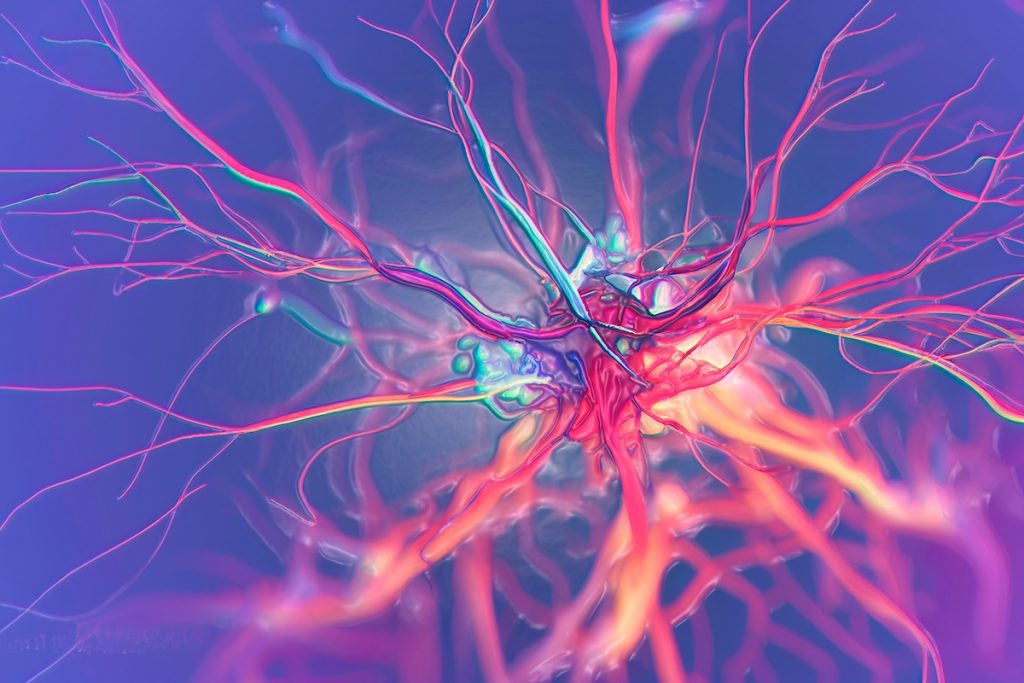[ad_1]
Previous to this examine, there was little or no identified about bettering the standard of life for these identified with motor neuron illness, a deadly neurological situation with a median life expectancy of two to 4 years. On this progressive illness, the motor neurons within the cortex and spinal twine degenerate, ensuing over time in limb paralysis, speech issues, the lack to swallow, and respiratory failure.
Globally, motor neuron illness impacts 4.5 individuals per 100,000 (Logroscino et al, 2018). The time period “motor neuron illness” contains these with amyotrophic lateral sclerosis (ALS, or Lou Gehrig’s illness), progressive muscular atrophy, and first lateral sclerosis.
In an try to contemplate whether or not high quality of life is likely to be improved for these identified with a motor neuron illness, Gould, McDermott, and colleagues evaluated the effectiveness of Acceptance and Dedication Remedy (ACT) plus common care, as in contrast with common care alone. ACT is a psychological strategy that includes acceptance, mindfulness, and behavior change methods.
The authors of this examine embrace over thirty psychiatrists, psychologists, medical medical doctors, clinicians, and different researchers at College School London, the College of Sheffield, and several other different universities and medical settings all through the UK and Sweden.

Motor neuron illness is a progressive illness with no remedy, involving a degeneration over time of the motor neurons within the cortex and spinal twine.
Strategies
This highly effective randomised managed intervention examine was carried out at 16 motor neuron illness care settings throughout the UK. 435 people identified with motor neuron illness had been approached, leading to 191 individuals who met eligibility standards, and 139 who accomplished the examine. Their intercourse roughly matched inhabitants incidence of the illness: 58% male, 42% feminine; and the ages ranged from 28 to 92, with a imply age of 63 (SD=11).
Members randomly assigned to the therapy group acquired as much as eight one-hour periods of ACT tailored for individuals with motor neuron illness, plus common care. These within the management group acquired common care alone. All members and their caregivers had been adopted up at 6 months and 9 months with a number of measures of well-being tailored for these with motor neuron illness.
Outcomes
Main end result evaluation confirmed strong therapy advantages for Acceptance and Dedication Remedy (ACT), a psychological therapy centered on acceptance, mindfulness, and behavior change methods. Compared with common care alone, ACT plus common care was superior at every of the 2 evaluation durations, with an adjusted imply distinction on the McGill High quality of Life Questionnaire-Revised (MQOL-R) of 0·66 (95% CI 0·22 to 1·10) at 6 months (d=0·46 [95% CI 0·16 to 0·77]; p=0·0031); and 0·76 (95% CI 0·30 to 1·22) and at 9 months (d=0·53 [95% CI 0·21 to 0·85]; p=0·0011).
Secondary end result analyses confirmed a number of particular advantages for members within the therapy group as in contrast with these within the management group. On the Psychological subscale of the MQOL-R, variations favoured these receiving ACT at each 6 months post-randomisation, with an adjusted imply distinction of 0·71 (95% CI 0·02 to 1·39) (d=0·30 [95% CI 0·01 to 0·60]; p= 0·043), and at 9 months, when the adjusted imply distinction was 1·10 (95percentCI 0·40 to 1·80) (d=0·47 [95%CI 0·17 to 0·78]; p=0·0020).
Equally on the Existential subscale of the MQOL-R, variations favoured these receiving ACT at each 6 months post-randomisation, with an adjusted imply distinction of 0·72 (95% CI 0·23 to 1·20) (d=0·43 [95% CI 0·14 to 0·73]; p= 0·0042), and at 9 months, when the adjusted imply distinction was 0·65 (95percentCI 0·09 to 1·21) (d=0·39 [95%CI 0·05 to 0·73]; p=0·023).
There have been advantages for the therapy group at 9 months on the Acceptance and Motion Questionnaire-II, an evaluation of psychological inflexibility. The adjusted imply distinction was –2·54 (95% CI –4·52 to –0·55) (d= –0·28 [95% CI –0·50 to –0·06]; p= 0·012.
There have been additionally variations at 6 months post-randomisation between the therapy and management teams on the Visible Analogue Scale, an evaluation of well being standing: the adjusted imply distinction was 6·49 (95% CI 1·28 to 11·7) (d= 0·30 [95% CI 0·06 to 0·54]; p= 0·015.
Lastly, logistic regression analyses confirmed that members within the therapy group had been much less more likely to progress to case ranges of melancholy on the modified Hospital Nervousness and Melancholy Scale. The prospect of transitioning from non-case to case degree at 6 months post-randomisation was 11% decrease within the ACT plus common care group in contrast with the same old care alone group (danger distinction –0·11 [95% CI –0·22 to –0·01]; p=0·044).
No different vital between-group variations had been noticed.
I discovered the entire Tables and Figures on this report back to be thoughtfully designed for significant communication. As one instance of this, Figure 2 affords a compelling visible illustration of the advantages of ACT. As in contrast with these within the management group, members within the therapy group had been extra psychologically versatile, had higher disease-related functioning, higher well being standing, much less melancholy and nervousness, and higher high quality of life than those that acquired common care alone.

Acceptance and Dedication Remedy works to enhance high quality of life for individuals with motor neuron illness.
Conclusions
It is a landmark examine for these affected by motor neuron illness, the primary adequately powered randomised managed trial of a psychological intervention for this critical, debilitating, and deadly illness. The researchers discovered that:
ACT plus common care was superior to common care alone for sustaining or bettering high quality of life in individuals with motor neuron illness.
This examine exhibits that Acceptance and Dedication Remedy will be safely supplied to these with motor neuron illness. Members could obtain higher well being standing and a higher high quality of life, in addition to a diminished chance of experiencing melancholy and nervousness.

The advantages of ACT for individuals with motor neuron illness included higher well being standing and high quality of life and fewer chance of melancholy and nervousness.
Strengths and limitations
As the primary highly effective randomised managed intervention examine of a psychological strategy to motor neuron illness, this examine supplies practitioners with an strategy that addresses the emotional and psychological dimensions of this debilitating, progressive, and deadly illness. Practitioners lastly have a therapy they will suggest that has been proven to have necessary advantages to sufferers’ high quality of life.
In demonstrating the advantages of Acceptance and Dedication Remedy (a psychological strategy that mixes acceptance, mindfulness, and behavior change methods) for these with motor neuron illness, this can be a promising examine for individuals who expertise the influence of a neurodegenerative illness that normally ends in dying in two to 4 years.
There are, nonetheless, limitations to the generalisability of the findings. Most significantly, maybe, examine respondents tended to be early of their illness course. Two-thirds of members had been lower than a 12 months post-diagnosis, and their practical impairment was pretty gentle on common. A comparatively small proportion had been clinically depressed (9%, 18 of 191) or anxious (21%, 41 of 191) on the modified Hospital Nervousness and Melancholy Scale. Moreover, these on the most superior illness stage had been excluded from the examine. The findings due to this fact could or could not apply to those that are farther alongside within the illness course of.
One other limitation to the generalisability of those findings is that most members (97%, 185/191) self-identified as White or White British. The authors of the examine don’t present a motive for the under-representation of ethnic minorities, though there’s proof displaying that White individuals have a better incidence of motor neuron illness than others (Burchardt, Mei, et al., 2022).
A 3rd limitation is that ACT was in comparison with a non-active management situation. Between-group variations may due to this fact have been attributable to elements like elevated consideration or social assist relatively than the intervention itself.
Lastly, this examine terminated at 9 months post-randomisation. We don’t know the way lengthy the advantages held, or whether or not they may proceed to accrue over time.

ACT is a promising strategy practitioners can suggest to handle the emotional and psychological dimensions of motor neuron illness.
Implications for follow
I do know from private expertise how devastating it may really feel to be identified with a degenerative motor dysfunction, though my prognosis—rheumatoid arthritis—will not be as debilitating or extreme as motor neuron illness, neither is it deadly. I can solely attempt to think about how difficult it have to be for these identified with motor neuron illness that not solely includes rising incapacitation however can be more likely to result in dying inside two to 4 years.
Up till now, practitioners working with motor neuron illness haven’t been capable of provide any confirmed approaches to serving to sufferers resist being overwhelmed by the state of affairs they discover themselves in. For the primary time, there’s now a psychological therapy that has confirmed advantages for these within the early to center levels of the illness. Acceptance and Dedication Remedy supplies hope to all these affected by it, together with sufferers, practitioners, caregivers, buddies, and kinfolk. Based mostly on the findings reported right here, we are able to conclude that ACT must be supplied by all therapy centres together with therapies that assist the medical and bodily features of sufferers’ situation.
It occurred that this examine was interrupted by altering therapy protocols throughout COVID-19. One profit from this surprising shift in plans, leading to 86% (547 of 635) of periods being delivered by video name, was that researchers had been capable of display the feasibility of distant intervention supply. Which means that even sufferers who expertise hardships attending to therapy services, together with those that stay in distant areas in addition to these whose impairment renders journey too onerous, can profit from ACT.
I discovered the lack of ethnic variety on this examine to be placing, notably as a result of the examine was so thoughtfully well-designed. Was there one thing in the way in which analysis topics had been recruited that led to non-White motor neuron illness sufferers excluding themselves? Perhaps one thing concerning the ethnic make-up of the therapy centres that participated within the examine? Maybe the shortage of variety displays differing cultural attitudes towards psychological interventions for a critical medical situation? No matter the way it occurred that 97% of members on this examine had been White, it could be good to know extra concerning the therapy efficacy for individuals of different ethnicities.
This examine ended at 9 months post-randomisation, with outcomes displaying sturdy advantages throughout many indicators of sufferers’ well-being. Additional analysis is required to research whether or not these advantages diminish over time, are maintained, or enhance. Linked questions embrace whether or not ongoing ACT will increase the advantages, and/or how its results may change over the course of the illness.

We have to know extra about the advantages of ACT, each for ethnic minority populations with motor neuron illness, and over a long run.
Assertion of pursuits
I’ve no conflicting pursuits linked to any facet of this examine.
Hyperlinks
Main paper
Rebecca L Gould, Christopher J McDermott, Benjamin J Thompson, et al on behalf of the COMMEND Collaboration Group (2024). Acceptance and Commitment Therapy plus usual care for improving quality of life in people with motor neuron disease: A multicentre, parallel, randomised controlled trial in the UK. The Lancet, Quantity 403, Concern 10442, 2381 – 2394
Different references
Logroscino, Giancarlo et al. (2018) Global, regional, and national burden of motor neuron diseases 1990–2016: a systematic analysis for the Global Burden of Disease Study 2016. The Lancet Neurology, Quantity 17, Concern 12, 1083 – 1097.
Burchardt J, Mei X. et al. (2022). Analysis of incidence of motor neuron disease in England 1998–2019: use of three linked datasets.
Picture credit
[ad_2]
Source link

